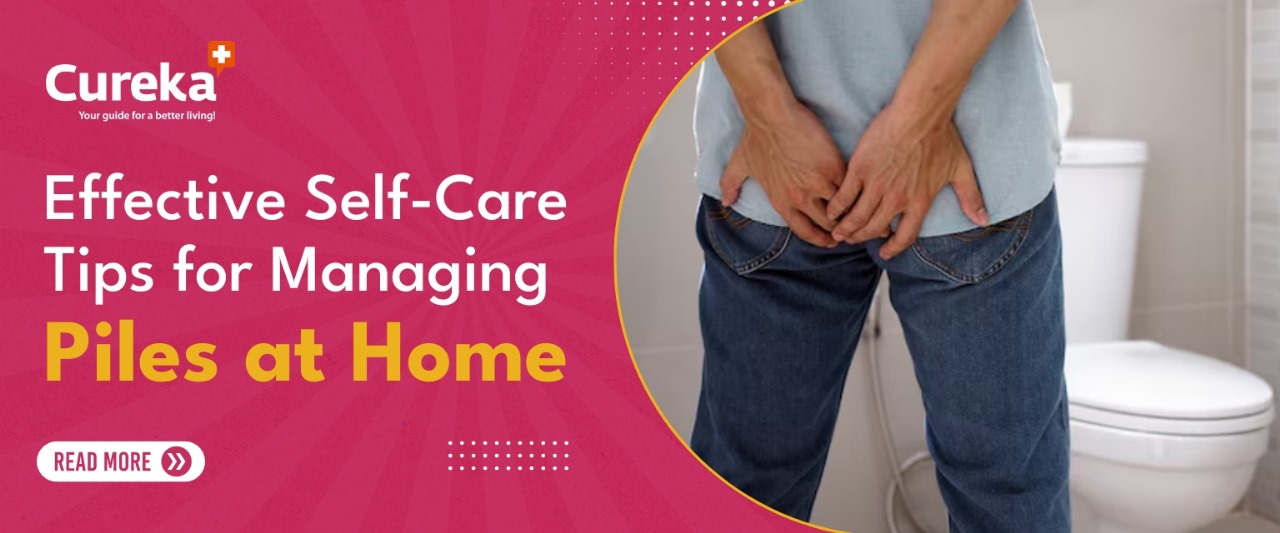Effective Self-Care Tips for Managing Piles at Home
Introduction:
Piles, also known as hemorrhoids, are a common but often under-discussed condition that can cause significant discomfort. They occur due to swollen and inflamed blood vessels in the rectal area, leading to symptoms like pain, itching, and bleeding during bowel movements. While medical treatments are available, many people seek natural remedies and lifestyle changes to manage and prevent piles. Self-care tips, dietary strategies, and herbal remedies can help you manage piles naturally, providing relief and promoting long-term anal health.
Causes, Types, and Symptoms:
Piles can develop due to several factors, including chronic constipation, prolonged sitting, a sedentary lifestyle, and a diet low in fiber. They are categorized into two main types: internal and external piles.
- Internal Piles: Located inside the rectum, these are usually painless but may cause bleeding during bowel movements.
- External Piles: These form under the skin around the anus and can be painful and itchy, often leading to significant discomfort.
Common symptoms include pain during bowel movements, itching or irritation around the anus, swelling near the anus, and bleeding. Understanding these symptoms is crucial for managing piles effectively.
Dietary Strategies to Manage and Prevent Piles:
Your diet plays a vital role in both preventing and managing piles. Incorporating the right foods can help reduce symptoms and prevent the condition from worsening.
- Increase Fiber Intake: A high-fiber diet is essential for softening stools and preventing constipation, a major contributor to piles. Include foods like fruits, vegetables, whole grains, and legumes in your meals. Fiber supplements, such as psyllium husk, can also be beneficial.
- Stay Hydrated: Drinking plenty of water—at least eight glasses a day—helps keep stools soft and reduces the need to strain during bowel movements.
- Incorporate Probiotics: Foods rich in probiotics, like yogurt, kefir, and fermented vegetables, promote a healthy gut microbiome, which can help prevent constipation and reduce piles’ symptoms.
- Healthy Fats: Include sources of healthy fats, such as avocados, nuts, and olive oil, which can promote digestive health and ease bowel movements.
- Limit Processed Foods: Avoid foods high in refined sugars and unhealthy fats, as these can exacerbate constipation and lead to the development of piles.
Lifestyle Changes to Support Piles Management:
Simple lifestyle modifications can have a significant impact on managing piles and preventing flare-ups.
- Regular Exercise: Physical activity, such as brisk walking, jogging, or yoga, can improve bowel movements and reduce the risk of constipation. Regular exercise also helps maintain a healthy weight, which is crucial in preventing piles.
- Proper Toilet Habits: Avoid straining during bowel movements, as this can increase pressure on the rectal veins and lead to the development of piles. Consider using a squatting position, which is more natural and can ease the passage of stools.
- Use of Piles Cushion: If you have a sedentary job or spend long periods sitting, consider using a piles cushion. This specially designed cushion reduces pressure on the rectal area, alleviating discomfort and preventing the worsening of symptoms.
- Stress Management: Chronic stress can contribute to digestive issues, including constipation. Practice stress-reducing techniques like deep breathing, meditation, and mindfulness to support your digestive health.
Topical Treatments and Natural Remedies:
Topical treatments can provide immediate relief from the discomfort associated with piles, while natural remedies offer long-term benefits.
- Sitz Baths: Soaking in a warm sitz bath for 15-20 minutes several times a day can reduce swelling, soothe irritation, and promote healing.
- Aloe Vera Gel : Apply pure aloe vera gel to the affected area to reduce inflammation, itching, and pain.
- Witch Hazel : Known for its astringent properties, witch hazel can be applied with a cotton ball to reduce swelling and soothe irritation.
Herbal Remedies for Piles Relief:
Herbal remedies have been trusted for centuries to manage and alleviate the symptoms of piles naturally. These remedies not only provide relief from discomfort but also promote overall digestive health, helping to prevent the recurrence of piles.
- Triphala : A cornerstone of Ayurvedic medicine, Triphala is a powerful combination of three fruits—Amla, Haritaki, and Bibhitaki. It acts as a natural laxative, gently stimulating bowel movements without causing dependency. Triphala also helps detoxify the digestive system, reducing inflammation and promoting healing in the rectal area. Regular consumption of Triphala can prevent constipation, a leading cause of piles, making it an excellent long-term solution for maintaining digestive health.
- Neem: Known for its potent anti-inflammatory, antibacterial, and healing properties, Neem is effective in reducing the swelling and irritation associated with piles. Neem can be used topically in the form of a paste or oil to soothe inflamed tissues and reduce itching. Additionally, Neem’s antibacterial properties help prevent infections, which can be a concern in cases of bleeding piles.
- Turmeric : Turmeric is widely recognized for its anti-inflammatory and antioxidant properties, primarily due to its active compound, curcumin. When used for piles, turmeric can help reduce inflammation, alleviate pain, and speed up the healing process. Turmeric can be consumed in the form of a paste or taken orally with warm water or milk. Its ability to enhance digestion and reduce the strain during bowel movements makes it a valuable addition to piles management.
- Psyllium Husk : Psyllium husk is a natural fiber that aids in softening stools, making them easier to pass without straining. By adding bulk to the stool, psyllium helps maintain regular bowel movements and prevents constipation. This not only alleviates the pressure on rectal veins but also reduces the risk of developing or worsening piles. Regular intake of psyllium husk mixed with water can be a simple and effective way to ensure digestive regularity.
- Jimikand (Yam): Jimikand, or elephant foot yam, is beneficial for its high fiber content, which supports healthy digestion. It helps in softening stools and reducing the strain on rectal veins, thereby preventing and managing piles. Jimikand also has anti-inflammatory properties that can help in reducing the swelling and discomfort associated with piles.
- Myrrh: Myrrh is another herb known for its strong anti-inflammatory and astringent properties. It can be used topically to reduce swelling, stop bleeding, and promote healing in the affected area. Myrrh also helps in tightening the tissues, which can be beneficial in managing external piles.
- Vetiver: Vetiver, with its cooling properties, provides relief from the burning sensation often experienced with piles. It can be used topically to soothe the inflamed area and reduce discomfort. Vetiver also has calming effects, which can help in managing the stress that often accompanies chronic conditions like piles.
- Ironwood and Indian Barberry : Both these herbs are known for their ability to strengthen blood vessels and reduce bleeding, making them effective in managing the symptoms of piles. Indian Barberry, in particular, has anti-inflammatory and antimicrobial properties, which help in reducing swelling and preventing infections.
- Nagkesar : Nagkesar is highly regarded in Ayurveda for its hemostatic properties, meaning it helps control bleeding, a common symptom of piles. Additionally, Nagkesar reduces inflammation and promotes healing, making it an effective remedy for managing piles.
- Mimosa Pudica (Lajjalu): Mimosa Pudica, also known as Lajjalu, is used for its astringent properties, which help reduce swelling and inflammation in the rectal area. This herb is particularly beneficial in providing relief from bleeding piles and soothing irritated tissues.
- Amorphophallus Dubis (Soorana): Soorana is another Ayurvedic herb known for its effectiveness in managing digestive disorders, including piles. It helps in reducing the symptoms by improving digestion and alleviating constipation, which is a major cause of piles.
- Arshogini Bati: Arshogini Bati is a traditional Ayurvedic formulation that contains a blend of herbs specifically chosen for their ability to alleviate the symptoms of piles. This remedy works by reducing inflammation, stopping bleeding, and promoting the healing of affected tissues.
Surgical Procedures for Piles:
In cases where piles are severe or do not respond to conservative treatments, surgical options may be necessary. Various procedures can be used to treat piles, depending on their type, size, and severity.
Rubber Band Ligation : A common procedure for internal piles, where a rubber band is placed around the base of the blood vessel to cut off its blood supply. The enlarged vessel then shrinks and falls off within a few days.
Sclerotherapy: This involves injecting a solution into the engorged blood vessel, causing it to shrink. It’s typically used for small internal piles and is a less invasive option.
Hemorrhoidectomy : A surgical procedure to remove large external or internal piles. While it’s the most effective treatment for severe piles, it requires a longer recovery period.
Stapled Hemorrhoidopexy : A less painful alternative to hemorrhoidectomy, this procedure involves stapling the pile back into its normal position within the rectum, cutting off its blood supply so it eventually shrinks.
Laser Treatment: This is a minimally invasive procedure that uses laser energy to shrink piles. It’s associated with less pain and a quicker recovery time compared to traditional surgery.
Post-Surgery Care for Piles:
For those who have undergone surgery for piles, post-operative care is crucial for a smooth recovery and prevention of recurrence.
- Sitz Baths: Continue using sitz baths to keep the area clean, reduce pain, and promote healing.
- Adhere to Dietary Guidelines: Maintain a high-fiber diet and stay hydrated to prevent constipation and straining, which can aggravate the surgical site.
- Avoid Straining: Straining during bowel movements can put pressure on the surgical site, leading to complications. Use stool softeners if recommended by your doctor to ensure smooth bowel movements.
- Medication: Follow your doctor’s advice regarding painkillers and any other medications prescribed post-surgery.
Conclusion
Managing piles at home requires a multifaceted approach, combining dietary adjustments, lifestyle changes, topical treatments, and herbal remedies. By incorporating these strategies, you can effectively manage symptoms, prevent flare-ups, and promote overall anal health. However, it is important to seek professional medical advice if symptoms persist or worsen, as untreated piles can lead to complications. Prevention is always better than cure, and by maintaining a healthy lifestyle, you can significantly reduce the risk of developing piles in the first place.











